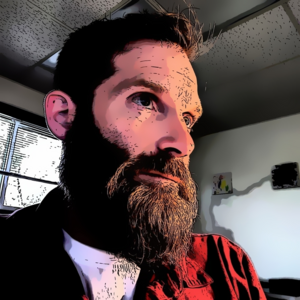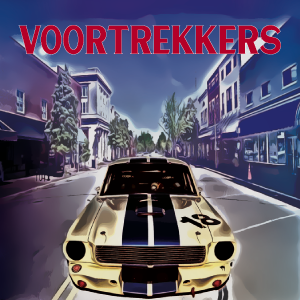They rode wrapped in a blanket of silence. The only sound that of rubber rolling over rough road and the motor’s muted tone. Tall conifers towered on either side of the lane. They encroached unbroken to the edge of the barrow ditch and cast long shadows upon the blacktop. The sun filtered through them and flashed in bright splashes across the Nissan’s windshield.
Gunnar’s parents lived in the border country between Montana and Idaho, along a narrow path the locals called the Old Highway. Once it had been the main road through the region but a wider an∂ more modern highway had robbed it of its importance long ago. Much of the new road had been laid upon the bed of the old but a portion of the original still survived, severed from the rest. A small eclectic population subsisted along it, homes and enclaves occupied by a trickling influx of refugees fleeing the growing tumult of the metropolises, an uneasy assortment of outlaws, expatriates, potato farmers, and retirees.
The GT-R approached a stop sign that stood at the junction of the old highway with the new. Gunnar slowed the car. Rogers twisted his head to the right and glanced over his shoulder. He did it out of habit but it was unnecessary. At best he might find a short haul truck, delivering goods from Spokane, but he knew where those all stood. Nevertheless, he peered through the passenger window and down the deserted roadway and checked for traffic. There was none to be found.
“Clear,” he said.
Gunnar never stopped, accelerating across the highway and into the far lane. He wound the motor up to redline in every gear, and in seconds the silver Nissan was streaking over the pavement at speed.
Above them the sky was a clear blue, broken only by a sporadic wisp of cirrus cloud. Time had burned the tension from Rogers’ body and he relaxed into the bucket seat and laid his head against the rest. There was nothing he could do at the moment and he set his mind adrift. His eyes moved from one sight to another, a ponderosa pine with its top broken off, a conspiracy of ravens that fled the decaying carcass of the road killed deer they had been picking at in a black flapping mass. Rogers hands were in his lap. His fingers were intertwined and the tips of his thumbs rested lightly against one another.
A road entered from the north, running downhill to intersect with the road on which they traveled. The car rocketed past it and Rogers peered reflexively up the grade. The road was a minor state highway, but it was wide and well surfaced, and it ran through one of the most remote and wild drainages in the entire country. A loose collection of souls, a population even more bent on disconnecting from society than those on the Old Highway, lived along its twisting route, which followed the course of a river known as the Yaak.
The Yaak had carved a narrow, secluded valley out of the endlessly forested mountains, one that had borne witness to various stages of boom and bust over the years, at least since white men had arrived in it. The climate was harsh and inhospitable and the local tribe of native Kootenai had never felt it worthy of permanent settlement. Its prosperity was contingent on its natural resources and whether it was profitable, or at least in vogue, to extract them. Industry in the valley had grown stagnant of late, nullified by insurmountable transportation costs and the successful efforts of distant environmental groups to see the area designated a wild and scenic place. Most inhabitants survived on table scraps left by wealthy vacationers who maintained expensive summer homes along the river that they rarely occupied. The few intrepid souls who remained year-round were mostly recluses and renegades. They had gone looking for a place to escape and this was the end of the line.
There was a certain magic to that country. It was like something out of a fairy tale. Despite the demanding and impoverished conditions that prevailed in the Yaak, life always seemed to make more sense up there. At least that was how it made Rogers feel. Brady Yargus lived up that road. With that flashing thought, Rogers knew instantly that his friend was close.
The Nissan topped a small rise and they found themselves staring down a short grade. Ahead of them, the road disappeared around a sharp right hand turn. Both Rogers and Gunnar knew the corner and what it signified, the beginning of a series of serpentine curves that would carry them down from the height of land they were currently on to the valley bottom below. At the foot of that grade the highway crossed the Yaak River just a short distance upstream from its confluence with the Kootenai. Another half dozen miles farther lay the town of Troy.
Rogers perceived the trouble before he heard or saw it. In the seat beside him, Gunnar’s body spasmed at the sound of the siren and his already pasty face turned ghostly white. Looking over his shoulder, Rogers caught sight of the flashing lights, coming on fast. A physical sensation, like riding in a fast elevator, overtook him and consolidated in his stomach. His focus intensified. His vision expanded, and each sound that reached his ears became distinct and clear.
There was a sheriff’s deputy behind them. It was the one from the State Line House, and now he had his lights on and was signaling them to stop. Gunnar hesitated for a moment. He seemed to be weighing his options, seriously considering making a run for it. The lifeless body was in his eyes. Suddenly his foot came off the accelerator and he braked hard, as hard as he could. The action was made just in time, the Nissan nimble enough to make the abrupt detour into the large potholed tract that opened on their right.
It was a wide, flat lot, an overlook. It sat at the edge of a bluff, atop steep slopes that fell precipitously into the Kootenai River valley. The car flew into it, throwing up a cloud of dust as it came skidding to a halt. Bits of gravel exploded from the tires like a shotgun blast. The deputy was right behind them. They came to a stop and Gunnar gripped the steering wheel with both hands. He stared straight ahead and Rogers saw the muscles of his jaw working as he ground his teeth.
The officer was out of the patrol vehicle quickly, too quickly. He could not have had time to call in the stop via radio. Looking in the side mirror, Rogers strained to see if the man spoke into the microphone pinned to his lapel. He did not appear to, but Rogers could not be sure. It might be that the sheriff’s office ran on the same net as they did. He might not be able to call.
The officer stopped at the rear quarter window of the GT-R. He was on the driver’s side and he withdrew his automatic from its holster and pointed it in Gunnar’s direction. The deputy didn’t trust them, and he wasn’t taking any chances. He was outnumbered, without backup, and had probably just caught sight of the assault rifle in the sports car’s back seat. He rapped on the driver’s door window with the barrel of his handgun. Then he changed his grip, holding the pistol with two hands, and tried to shield his body from them as best he could.
“Driver, let me see your hands,” he ordered. Inside the car, his voice was muffled but still distinguishable. When Gunnar held them up, the deputy continued. “Using your right hand, reach over and open the window. Slow.”
Gunnar powered down the window. It retracted into the door cavity with a whine. When it was about three quarters of the way, the deputy commanded him to stop. Rogers sat, silently. Everything appeared vividly but less than real, like in a dream. The officer was talking again.
“Driver, put your left hand out the window. Passenger, do not move. Driver, with your right hand, reach through the window and unlatch the door from the outside. Good. Passenger, don’t move. Now keep your hands on the window there, driver, and exit the vehicle. Slow, slow. Hands on your head. Yep, just like that. Passenger, do not make a move.”
Gunnar was standing outside of the Nissan. He faced forward and his hands were on top of his head. The deputy, Rogers remembered his name was Davis, grabbed Gunnar by a belt loop and pulled him backward, his gun pointed directly where Gunnar’s skull met his spine. His body was tensed for action. He walked Gunnar backward to his patrol vehicle and opened the rear passenger door and with a quick motion stuffed the redhead into the back seat. Davis closed the door with a shove and returned to the GT-R.
He followed the same procedure with Rogers, except that he cuffed the athlete’s hands behind his back and placed him in the front of the patrol vehicle. It was uncomfortable and Rogers upper extremities quickly grew numb from sitting on them. Rogers squirmed a little and got his weight on his hip in an attempt to relieve the discomfort. He watched as Davis again approached the car.
The deputy was more relaxed now, and although he kept his pistol in hand, the officer’s movements were a much more casual. The stress he had held in his shoulders was gone and he peered into the car through the windows and when he was certain that the GT-R was empty, he relaxed even further. There was something he wanted inside the car, in the back seat, the assault rifle Rogers assumed, and he reached his left hand out toward the open door and pushed it forward. The deputy took one last quick glance around before holstering his pistol and then plunged his upper body into the sports car’s cramped rear compartment.
Rogers saw movement. It was Lee. He slipped silently to within arm’s reach of Davis, stalking him with a surety and swiftness that impressed Rogers. Quiet though he was, Davis sensed him at the last moment and struggled to extricate himself from the Nissan’s close confines. But Lee’s timing was perfect and the muzzle of the revolver he carried outstretched before him met the back of the officer’s head at the exact same instant that Davis pulled himself from the rear of Nissan and stood. Gunnar’s AR-15 trailed in the deputy’s grasp and he almost dropped it when the revolver’s barrel made contact with his neck. The steel felt cold, a strange contrast to the hot summer sun that beat down on them.
“Don’t,” Lee Harper told him. He emphasized his point with a gentle nudge from the pistol. “You might get me, but my buddy in the trees will splash you all over the place.”
The officer hesitated. Lee sensed his disbelief.
“Go ahead. Try me, fucker.”
Quickly, with precise movements, Lee stripped the officer of his gun belt and link. He kept the pistol pressed firmly against the man’s skull and when he had secured all the paraphernalia, he maneuvered the deputy to the front of the GT-R and shoved him face down with the heavy revolver. The man splayed across the Nissan’s hood.
Harper knew each cop car was linked, that the officers were too. Whether the camera in the dash of the patrol vehicle had a live feed or not, he wasn’t sure.
“Where’s your backup? You call this in?” he asked sharply.
He patted at the small of the man’s back, kicked at his ankles. The point of his boot banged against something hard and bulky, a small holdout gun in an ankle holster. Lee ground his left knee into the back of the deputy’s leg and stomped on his foot with the opposite heel and pressed the man’s face into the Nissan’s paint with the muzzle of his revolver.
“Scotty,” Harper yelled.
Scott Ewell appeared from behind one of several semi-trailers that had been left abandoned in the lot and moved toward Lee. Harper kicked the gun belt over to him.
“Get ‘em out of there.” He gestured at the deputy’s patrol vehicle with his head.
Scotty freed first Rogers and then Gunnar from their confines and removed the cuffs from their hands.
“Tool, get those fuckin’ cuffs back over here. Then get that shotgun from the dash there and blow the guts outta that fuckin’ rig. Move, gawdammit!”
The tall teen moved, in a rush. Rogers rubbed his wrists. The cuffs flew through air and Lee snatched them with his one free hand. He locked the shackles around the deputy’s wrists with perfect technique.
He grabbed the chain that connected the cuffs and pulled the deputy to his feet. Davis came without a struggle and Lee hauled him bodily toward the abandoned semi-trailers. The deputy craned his head around and Harper shoved him violently onward.
They arrived at the back of one of the semi-trailers and Lee pressed the deputy against the door on the left and pinned him there as he slipped his pistol into its holster. It was a Western-style gunslinger’s rig, worn low on his hips and secured to Harper’s thigh with a rawhide lace. Magnum ammunition ringed his waist, each cartridge encased in its own loop of leather. Copper and brass glinted in the sun. With his gun hand now free, Lee unlatched the semi-trailer's right door and swung it open.
The Harper family lived on a small farm that had been in their line for generations. Jeffery Harper, current head of the clan, spent six weeks at a time working as a mechanic on wind farms out east. When he was present, he was a strict authoritarian. He felt children made the best farm hands, because they couldn’t quit and you didn’t have pay them. As soon Lee was strong enough, he was put to work; splitting kindling, building fence, stacking firewood, and bucking bales for hours on end. He could lift a sack of oats with one hand and press a bale of hay over his head with ease. A single powerful forearm kept the sheriff’s deputy pinned against the semi-trailer.
Up to this point the man had remained passive, almost a willing participant in the proceedings, but now he began to fully grasp the extent of his predicament. Lee’s intentions were clear and the officer knew time was running short to consider his options for escape. He squirmed slightly in Lee’s grasp, testing the young man’s strength.
“You know you’re not gonna get away with this, kid,” the deputy said. He tried to make it sound assertive, but the slight tremor in his voice betrayed him. He suddenly realized he had missed any chance to avoid the immediate outcome. “I know who you are. I know who all of you are.”
Deputy Don Davis weighed one hundred and seventy-eight pounds. Lee didn’t hesitate. Before the man had even finished his sentence, Harper took the officer by the collar with one hand and grabbed his waistband with the other and hoisted him into the semi-trailer's dark interior. The man landed in a heap.
“That’s for Calvin Jones,” Lee said, his voice reverberating angrily through the trailer. “You left him to die in the dirt. I saw you pull away. If I’m wrong, I’ll pay for my mistake. But I ain’t wrong often.”
The deputy tried to scramble to his hands and knees. In response, Harper quickly slammed the trailer’s door shut and closed the latch. The sound of the man pounding against metal door followed him as he walked away.











Comments (0)
See all